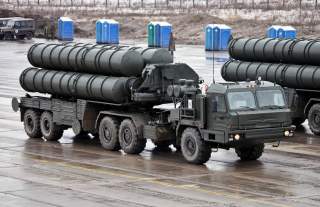Turkey and the Russia's Deadly S-400: The Air Defense System That Changed Everything
The S-400 stands to change everything without firing a single shot.
Now, one might rightly ask why the Turkish Armed Forces’ top command at the time, who devoted more than half of their years in service to protect the free world from a Soviet invasion, would metaphrase a career KGB officer turned Russian president’s defiant geopolitical proclaim about the world order? The answer is that Ankara had considered the political design that the United States brought to Turkey’s doorstep—the emergence of a Kurdish regional autonomy that could lead to the permanent dissolution of Iraq along with an ethnic-separatist fallout hitting Turkish territorial unity—to be a significant threat.
Turkey’s domestic political dynamics have drastically changed over the years, but as a state, its geopolitical imperatives are there to stay. Today, the Turkish presidency, who has a very different profile compared to the Turkish General Staff in 2007, is equally frustrated with Washington’s decision to back the PYD/YPG-dominated Syrian Democratic Forces. Because, as reiterated by former U.S. Secretary of Defense Ashton Carter during his tenure, these groups have substantial ties with the PKK terrorist organization.
Washington has opted for using the Patriot offer with offset opportunities married to the Countering American Adversaries Through Sanctions Act (CAATSA) sanctions as the “carrot and stick” composition to kill the S-400 deal. However, the key to change Ankara’s mind about its rapprochement with Russia was altering American policies in Syria. Anybody who needs proof about this analysis could revisit how Moscow, whose Su-24 was downed by the Turkish Air Force back in 2015, has managed to come this far. By opening up the Syrian airspace for Operation Euphrates Shield and Operation Olive Branch, the Kremlin showed that it appreciated Turkey’s regional security priorities much better than the West.
On the one hand, Turkey was forced out of the F-35 project, acquired a sound SAM system that would offer only limited ballistic missile defense performance when operated standalone, and key Turkish entities could be exposed to the U.S. sanctions. Washington, on the other hand, may soon penitently realize that a key NATO ally bordering Iran, Iraq, and Syria was more valuable than the PYD/YPG who established neo-Maoist communes in northern Syria. Russia, the sole winner of the equation, has sold the S-400 system to a critical NATO nation without any technology transfer, and might soon cause a sanctions crisis between the two members of the North Atlantic Alliance. The S-400 stands to change everything without firing a single shot.
Dr. Can Kasapoglu is the defense analyst of the Istanbul-based think-tank EDAM and IPC-Stiftung Mercator Fellow at the German research institute SWP. Dr. Kasapoglu holds a Ph.D. from the Turkish War College and an M.Sci. degree from the Turkish Military Academy. Previously he was an Eisenhower Fellow at the NATO Defense College in Rome and held a visiting research post at the NATO Cyber Center of Excellence in Tallinn. His works can be followed @EdamDefense.
Image: Wikimedia Commons.

